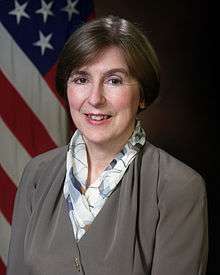Sara E. Lister

Sara E. Lister is a United States lawyer who served as General Counsel of the Army under the Carter administration and then as Assistant Secretary of the Army (Manpower and Reserve Affairs) from 1994 to 1997. She gained national attention in November 1997 when she gave a speech in which she referred to members of the United States Marine Corps as "extremists". She was ultimately forced to resign early as Assistant Secretary of the Army because of the controversy over her remarks.
Biography
Sara E. Lister was educated at Radcliffe College (B.A.), George Washington University (M.A. and J.D.), and Yale University (incomplete PhD studies).[1]
During the Carter Administration, Lister served as Deputy Special Assistant to United States Secretary of Defense Harold Brown; as Deputy General Counsel of the Navy; and as General Counsel of the Army.[1] During her time as General Counsel of the Army, Lister headed a group that studied the usefulness of the Armed Forces Qualification Test (AFQT).[2] This group issued a report—the so-called "Lister Report"—that recommended that "the Army should eliminate use of mental categories and should revise AFQT cut scores based on a new analytical framework ... each military service should set scores at the optimum levels to achieve its own accession goals."[2] According to one commentator, this report essentially "recommended reducing standards as necessary to meet strength goals".[2]
With the election of Ronald Reagan in 1980, Lister left government service to practice law in the private sector.
On January 24, 1994, President Bill Clinton nominated Lister to be Assistant Secretary of the Army (Manpower and Reserve Affairs).[3]
On October 26, 1997, less than one month before her scheduled retirement as Assistant Secretary of the Army on November 21, 1997, Lister participated in a seminar in Baltimore.[4] During that seminar, Lister made the following comments about the relationship of the military with the civilian world:
| “ | I think the Army is much more connected to society than the Marines. The Marines are extremists. Whenever you have extremists, you have some risks of total disconnection with society. And that's a little dangerous.[4] | ” |
Leaders of the U.S. Marine Corps did not take kindly to being labeled "extremists" and spoke out against Lister. On November 13, 1997, the United States House of Representatives passed a concurrent resolution condemning Lister's remarks, stating that her characterization of the Marine Corps as "extremists" "denigrates 222 years of sacrifice and dedication to the Nation by the Marine Corps and dishonors the hundreds of thousands of Marines whose blood has been shed in the name of freedom"; and calling for Lister's resignation.[5] Newt Gingrich, the Speaker of the United States House of Representatives sent a letter to President Clinton in which he called Lister's remarks "completely out of order" and insulting to all military personnel. Gingrich wrote: "Nothing less than her dismissal and a full apology on your part to America's sons and daughters in uniform will suffice to repair this breach."[4] Lister issued a formal apology for her remarks on November 14, 1997, and Defense Secretary William Cohen accepted her apology.[4] However, amidst ongoing criticism about the remarks, Lister resigned her office one week early, on November 15, 1997.[4]
References
- 1 2 White House Press Release: "President Names Three to Uniformed Service Posts", Jan. 24, 1994
- 1 2 3 Michael J. Meese, "The Army Officer Corps in the All-Volunteer Force", Contemporary Economic Policy, Apr. 2002
- ↑ Public Papers of the Presidents of the United States - William J. Clinton, 1994, Bk. 1, p. 1374
- 1 2 3 4 5 Sam Fulwood III and Paul Richter, "Army's Top Woman Quits Position Under Heavy Fire", Los Angeles Times, Nov. 15, 1997
- ↑ 105 H. Con Res. 197
| Government offices | ||
|---|---|---|
| Preceded by Jill Wine-Banks |
General Counsel of the Army 1980 |
Succeeded by Delbert Spurlock |
| Preceded by Robert S. Silberman |
Assistant Secretary of the Army (Manpower and Reserve Affairs) 1994 – November 15, 1997 |
Succeeded by Patrick T. Henry |